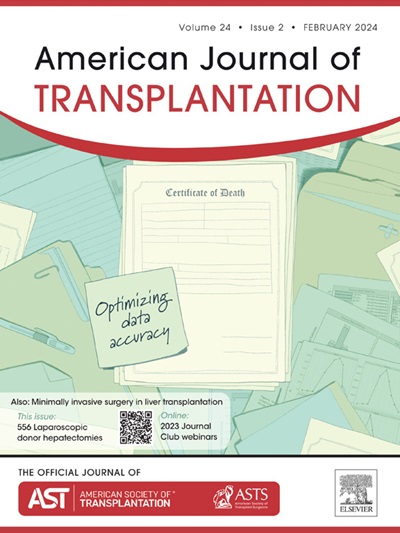移民身份对小儿肾移植受者预后的长期影响。
IF 8.2
2区 医学
Q1 SURGERY
引用次数: 0
摘要
本研究旨在调查单中心环境下证件身份对小儿肾移植结果的影响,强调州和联邦政策(如 "童年抵达者暂缓遣返"(DACA))对患者结果的重要影响。研究分析了 1998 年至 2011 年间接受首次肾移植的 283 名儿童患者,其中包括 48 名无证患者。无证患者和美国居民的未调整全因存活率(P=0.91)和死亡删减存活率(P=0.38)在移植存活率方面没有明显差异。此外,在考克斯比例危险模型中,移民身份与全因移植物存活率无显著相关性(HR 0.87 95% CI 0.51-1.46,P=0.6)。对无证人群进行了电话访谈。与 41/48 名无证受者取得了联系。95%的人有保险,68.3%的人有医疗补助或医疗保险。DACA 获得者的就业率更高(88% 对 67%,p=0.11),更有可能完成高中以上学位(47.1% 对 12.5%,p=0.01)。移民身份对长期移植存活率没有影响,这表明国家资助的保险和DACA资格的扩大可能会改善无证患者获得移植治疗的机会。此外,与非 DACA 受助者相比,DACA 受助者的就业率和受教育程度呈上升趋势。本文章由计算机程序翻译,如有差异,请以英文原文为准。
Long-term impact of immigration status on outcomes in pediatric kidney transplant recipients
This study aimed to investigate the effects of documentation status on pediatric kidney transplant outcomes in a single-center setting, emphasizing the significance of state insurance access for undocumented patients and federal policies like Deferred Action for Childhood Arrivals (DACA) on patient outcomes. A cohort of 283 patients, including 48 undocumented individuals, who received their first kidney transplant as children between 1998 and 2011 was analyzed. There was no significant difference in unadjusted all-cause (P = .91) and death-censored (P = .38) graft survival between undocumented patients and patients with permanent legal status, subsequently referred to as US residents. Additionally, in the Cox proportional hazards model, immigration status was not significantly associated with all-cause graft survival (hazard ratio 0.87, 95% CI 0.51-1.46, P = .6). Telephone interviews were conducted with the undocumented cohort. Forty-one of 48 of the undocumented recipients were contacted. Ninety-five percent had access to insurance with 68.3% on Medicaid or Medicare. DACA recipients exhibited higher employment rates (88% vs 67%, P = .11) and were more likely to complete a degree beyond high school (47.1% vs 12.5%, P = .01). Immigration status did not impact long-term graft survival, suggesting eligibility expansions for state-funded insurance and DACA may improve access to transplant care for undocumented patients. Moreover, DACA recipients showed trends toward increased employment and education compared to non-DACA recipients.
求助全文
通过发布文献求助,成功后即可免费获取论文全文。
去求助
来源期刊
CiteScore
18.70
自引率
4.50%
发文量
346
审稿时长
26 days
期刊介绍:
The American Journal of Transplantation is a leading journal in the field of transplantation. It serves as a forum for debate and reassessment, an agent of change, and a major platform for promoting understanding, improving results, and advancing science. Published monthly, it provides an essential resource for researchers and clinicians worldwide.
The journal publishes original articles, case reports, invited reviews, letters to the editor, critical reviews, news features, consensus documents, and guidelines over 12 issues a year. It covers all major subject areas in transplantation, including thoracic (heart, lung), abdominal (kidney, liver, pancreas, islets), tissue and stem cell transplantation, organ and tissue donation and preservation, tissue injury, repair, inflammation, and aging, histocompatibility, drugs and pharmacology, graft survival, and prevention of graft dysfunction and failure. It also explores ethical and social issues in the field.

 求助内容:
求助内容: 应助结果提醒方式:
应助结果提醒方式:


